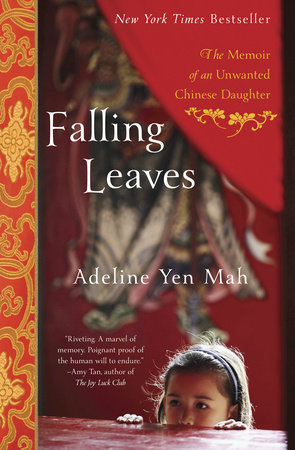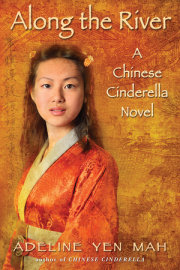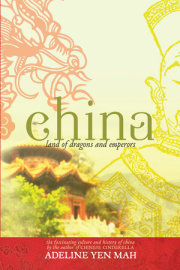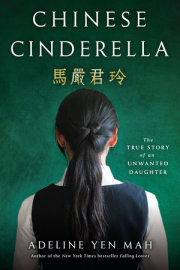Yi Chang Chun Meng: An Episode of a Spring DreamMy own memories of Tianjin are nebulous. Early photographs show a solemn little girl with clenched fists, pressed lips and serious eyes, dressed in pretty western frocks decorated with ribbons and bows. I enjoyed school and looked forward to going there. Lydia and I were pulled there and back daily in Grandmother's black, shiny rickshaw. It had a brass lamp on each side and a bell operable by foot. When I revisited Tianjin in 1987, I was surprised to find that it took only seven minutes to walk from our house to St Joseph's.
I remember Lydia as an imposing, rather intimidating figure. Between us there were three brothers and a gap of six and a half years. We were a world apart.
Lydia liked to exercise her authority and flex her muscles by quizzing me on my homework, especially catechism. Her favourite question was, 'Who made you?' To this, I always knew the answer. Like a parrot I would trot out the well worn phrase, 'God made met' then came the twister. A gleam came into her eyes. 'Why did God make you?' I never could answer because teacher never taught us beyond the first question. Lydia would then give me a resounding slap with her powerful right hand, and call me stupid. During our daily rickshaw rides, she liked to keep me waiting and was invariably late. On the rare occasions when I was delayed in class she simply rode the rickshaw home alone but would send the puller back to get me. She tended to be stocky, even as a child. Her physical deformity gave her a characteristic posture, with her semi-paralysed left arm hanging limply by her side and her face perpetually tilted slightly forwards and to the left. From my four-year-old perspective, she was a fearsome figure of authority.
My eldest brother Gregory had a sunny personality and the infectious ability to turn ordinary occasions into merry parties. His
joie de vivre endeared him to many people. Being the eldest son in China meant that he was the favourite of Father as well as of our grandparents. I remember him, full of mischief, gazing with rapt fascination at a long, black hair blowing in and out of the right nostril of snoring Ye Ye one hot afternoon. Finally Gregory could no longer resist the temptation. Skilfully, he pinched the hair ever so tightly between his thumb and index finger during the next exhalation. There was a tantalizing pause. Ye Ye finally inhaled while Gregory doggedly hung on. The hair was wrenched from its root and Ye Ye awoke with a yell. Gregory was chased by Ye Ye brandishing a feather duster but managed, as usual, to escape.
On the whole, Gregory ignored James and me because we were too young to be interesting playmates. He was always surrounded by friends his own age. He did not enjoy studying but, like Grandmother, excelled in games of chance such as bridge. Good with numbers, he occasionally taught us younger ones neat mathematical tricks, roaring with laughter at his own cleverness.
Of all my siblings, it was Edgar I feared the most. He bullied James and me and used us as punchbags to vent his frustration. He ordered us around to perform his errands and grabbed our share of toys, candies, nuts, watermelon seeds and salted plums. He did not distinguish himself at school and was deeply insecure, though he possessed enough fortitude to maintain a passing grade.
My
san ge (third elder brother) James was my hero and only friend. We used to play together for hours and developed a telepathic closeness, confiding to one another all our dreams and fears. With him, I could discard my vigilance and I needed that haven desperately. Throughout our childhood, it was immensely comforting to know that I could always turn to him for solace and understanding.
We were both Edgar's victims, though perhaps James suffered more because for many years he shared a room with our two eldest brothers. He hated to make waves. When pushed around, he endured the blows passively or hid from his tormentor. Seeing me being beaten by Edgar he would skulk quickly away in blinkered silence. Afterwards, when Edgar was gone, he would creep back and try to console me, often muttering his favorite phrase
'Suan le!' (Let it be!) . . .
Of Niang's two children, she openly favoured Franklin. In physical appearance he was the spitting image of Niang: a handsome boy with round eyes and a pert upturned nose. Susan at this stage was still a baby. But they were already special. I don't recall either Edgar or Lydia ever laying a finger on them. James and I were the ones singled out to do everyone's bidding. If we were not fast enough there was often a slap or a shove, especially from Edgar.
I always felt more comfortable with my friends at school than at home, where I was considered inferior and insignificant, partly because of the bad luck I had brought about by causing the death of my mother. I remember watching my older sister and brothers playing tag or skipping rope and longing to be included in their games. Although James and I were very dose, he went along with the others and became 'one of the boys' when they wished to preclude me.
At St Joseph's, marks were added together every Friday and the girl with the highest total received a silver medal which she could wear pinned on her breast pocket for the entire week. Father immediately noticed when I wore the medal. Those were the only times when he showed pride in me. Father would say teasingly, 'Something is so shiny on your dress. It's blinding me! Now what could it be?' or 'Isn't the left side of your chest heavier? Are you tilting?' I lapped up his words. Soon I was wearing the medal almost continuously. At prize-giving at the end of 1941 my name was mentioned for winning the scholarship medal for more weeks than any other student in the school. I remember my pride and triumph as I climbed up the steps, which were so high and steep that I had to go up on my hands and knees, to receive my award from the French monseigneur. There was warm applause and delighted laughter from the audience, but no one attended from my family, not even Father.
At the beginning of 1942 the Japanese were taking uncomfortably closer looks at Father's books, insisting on an exhaustive audit and finally demanding that his businesses be merged with a Japanese company. Father could remain nominally in charge but profits would be split 50/50. This 'offer' was, in fact, an order. Refusal would have resulted in confiscation of assets, probable jail for Father and unthinkable retaliation against the rest of the family. Acceptance meant open collaboration with the enemy, immediate loss of independence and possible reprisal from the underground resistance fighters.
After many sleepless nights, made worse by elaborate luncheons during the-day when the Japanese alternately cajoled and threatened, Father took a radical step. One cold day, he took a letter to the post office and never returned home.
Ye Ye carried on with this life-and-death charade for a few months. Those were chaotic days. Kidnappings, murders and disappearances were everyday events. He immediately went to the local police and reported his son missing. He placed advertisements in the newspapers offering a reward for knowledge of Father's whereabouts, alive or dead. It was a dramatic ruse and the price was high but ultimately it had the desired effect. Without Father at the helm, Joseph Yen & Company floundered. Many of the staff were laid off. Business dwindled. Profits plummeted. The Japanese soon lost interest.
Father, meanwhile, having managed to transfer part of his assets before his staged disappearance, made his way south to Japanese-occupied Shanghai under an assumed name, Yen Hong. He bought what was to become our family home on the Avenue Joffre. Soon afterwards he sent for Niang and Franklin, who travelled with a couple of trusted employees and joined him there.
For the rest of the family, stranded in Tianjin, life became oddly serene. Aunt Baba ran the household and encouraged us children to invite friends home to play and snack on various dim sums in a way Niang would never have tolerated. Mealtimes were informal and the adults talked and played mah-jong late into the evening. Ye Ye kept a skeleton staff in the office. By and large the Japanese left us alone. A chauffeur was hired and on Sundays we were driven to various restaurants to try out different cuisines, including Russian, French, and German. I remember drinking hot chocolate and eating pastries at the sparkling Kiessling Restaurant while a music trio played Strauss waltzes and Beethoven romances. Sometimes we were even taken to see suitable movies.
Father was keen that the rest of his family should join him in Shanghai. In the summer of 1942, Grandmother was persuaded to visit for two months but returned saying that Tianjin was now her home. She stubbornly refused to move and told Aunt Baba that the essence of life was not which city one lived in, but with whom one lived.
After dinner one stiflingly hot day, 2 July 1943, we were planning next day's menu with Cook. Aunt Baba suggested that we have Tianjin dumplings instead of rice. Freshly made with chives, ground pork and spring onions, these dumplings were a great favourite among us children. We were all shouting out ridiculously high numbers as to how many dumplings we could eat. Grandmother developed a headache from all the commotion. She went to her own room, lit a cigarette and lay down. Aunt Baba sat by her and narrated a story from
The Legend of the Monkey King. Even though Grandmother knew many tales from the well-known Chinese classic, she found it relaxing to hear them told again and again by her daughter.
She removed the shoes, stockings and bindings from her tiny damaged feet before soaking them in warm water to relieve the constant ache, giving a sigh of contentment. Aunt Baba left her and was taking her own bath when Ye Ye hammered on the door. Grandmother was twitching, frothing at the mouth. Doctors were called but it was too late. Grandmother never regained consciousness. She died of a massive stroke.
I remember waking up in the sweltering heat of a Tianjin summer morning. Aunt Baba was sitting at her dressing table and crying. She told me that Grandmother had left this world and would never come back; her life had evaporated like
yi chang chun meng (an episode of a spring dream). I recall the sound of cicadas humming in the background, while street-hawkers clicked wooden clappers to announce their presence, chanting their wares melodiously on the pavement below: 'Hot beef noodles. Stinky bean curd. Fresh pot stickers.' I wondered how it was possible that life could go on being so much the same when Grandmother was no longer with us.
Grandmother's body was placed in a coffin in the living-room. Her photograph sat on top and the coffin was elaborately decorated with white flowers, candles, fruits and banners of white silk covered with elegant, brush-stroked couplets memorializing her virtues. Six Buddhist monks came to keep watch, dressed in long robes. We children were told to sleep on the floor in the same room to keep her company. We were all terrified, mesmerized by the shaven, shining heads of the monks chanting their sutras in the flickering candlelight. All night I half feared and half hoped that Grandmother would push open the lid and resume her place among us.
Next day, there was a grand funeral. We mourners were all dressed in white, with white headbands or pretty white ribbons. We followed the coffin on foot to the Buddhist temple, accompanied by music and chants provided by Buddhist priests. Along the way, attendants threw artificial paper money into the air to appease the spirits. My brother Gregory took the place of chief mourner in the absence of Father, who was still hiding. He walked directly behind the coffin, which was placed on a cart and pulled by four men. Every few steps he would fall on his knees and start bewailing the loss of Grandmother at the top of his voice, banging his head repeatedly on the ground to make obeisance. We followed Gregory silently, marvelling at his performance.
Finally we arrived. The coffin was placed at the centre of an altar, surrounded by white floral arrangements, more silk banners and Grandmother's favourite dinner. There were about sixteen dishes of vegetables, fruits and sweets. Incense heavily scented the air. Prayers were chanted by monks. We were instructed to kowtow, kneeling and repeatedly touching our foreheads to the ground. The monks brought paper effigies of various articles which they thought she might need in the next world. There were masses of 'gold' and 'silver' ingots, a very intricate cardboard automobile resembling Father's Buick, an assortment of furniture and appliances, even a mah-jong set. These effigies were all burnt in a large urn. This delighted us children, and we eagerly helped stoke the urn by dropping in the effigies, forgetting in the excitement the purpose of the occasion and fighting over the paper car, which was very ingeniously made and covered with bright tin foil. Years later, Aunt Baba informed me that all of it, including the eulogizing banners, monks, flowers, musicians and effigies, were chartered from a speciality shop which arranged for such 'happenings' and supplied the appropriate props.
I remember watching the various paper images burning furiously and the smoke curling up and believing it would all regroup somewhere in the sky in the form of articles for the exclusive use and pleasure of Grandmother.
Our relatives and friends then followed us home and a lengthy and elaborate meal was served. Afterwards, we children were sent out to the garden to play. Lydia set up a makeshift urn. We manufactured paper stoves, beds and tables and began our own funeral for Grandmother. Soon the urn, which was a wooden flower pot, started to burn. Ye Ye came out in a fury, turned on the faucet and drenched us and our funeral pyre. We were sent to bed, but the incident helped to dissipate the dread and gloom of the last two days, and we felt that Grandmother was going to be happy in the other world.
Far away in Shanghai, Father grieved deeply. He could not accept that his beloved mother had died when she was just fifty-five. From then on, he wore only black neckties in honour of her memory.
The funeral marked the end of an era. We did not know it, but the carefree years of childhood were over.
. All rights reserved. No part of this excerpt may be reproduced or reprinted without permission in writing from the publisher.










